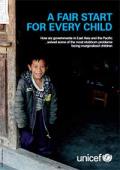Publications - Released in 2016
This study aims to better understand the motivation, success factors, and challenges experienced by six countries in the East Asia and Pacific (EAP) region, who have made significant shifts in policies and programmes in order to reach the most disadvantaged and marginalized children.
For UNICEF, “equity” means that all children have an opportunity to survive, develop and reach their full potential without discrimination, bias or favoritism. This concept is particularly relevant to the EAP region, which hosts one-third of the world’s population (two billion people), and one quarter of its children (580 million). Although Asia includes some of the fastest-growing economies in the world, it is also experiencing deepening disparities and increasing inequity, with many communities unable to access the benefits of political, social and economic progress. There are currently 379 million people living in poverty in the region, 97 million of them in extreme poverty and many experiencing multiple deprivations.
This study describes how significant change has been achieved in six countries. It reviews the success factors that enabled the leveraging of political will, resources and partnerships to achieve results in specific communities, and begin expanding to the rest of the country.






